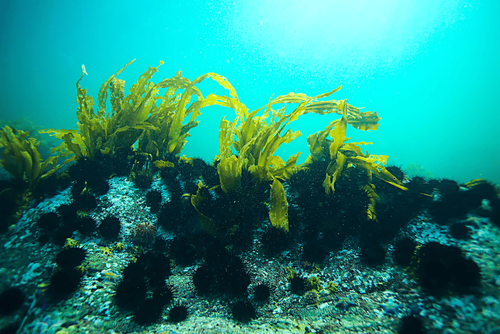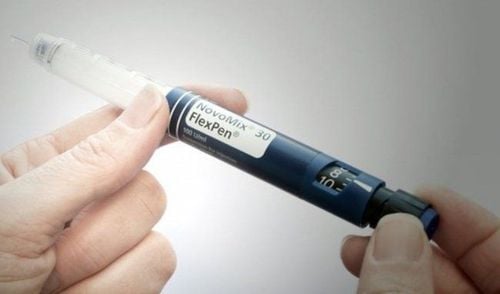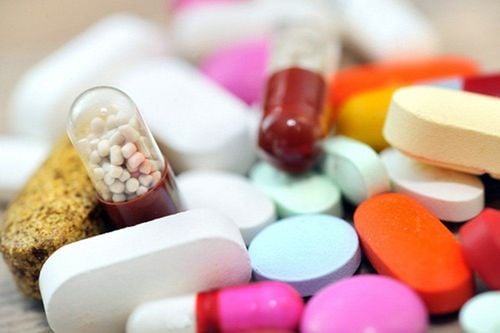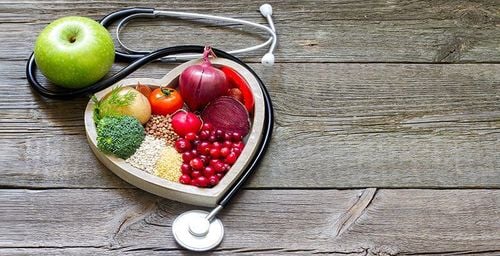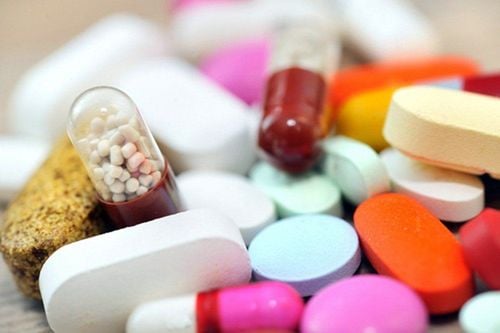This is an automatically translated article.
Is it good to eat sushi, is it not a problem to eat sushi with fat, is interested in sushi people, especially salmon sushi, because this is a delicious dish in Japanese cuisine that has been popular in Vietnam in recent years. recent years.
Sushi is a very popular dish in Japan that is loved by many people, including Vietnamese. The ingredients of sushi include rice, fish, seaweed, sushi is said to be a nutritious and healthy dish.
However, some people worry whether eating sushi is good because the ingredients of sushi include raw fish, they are quite salty when served with soy sauce that contains a lot of salt. To better understand sushi as well as its effects on health, learn through the detailed information below.
1. What is sushi?
Sushi is a dish consisting of seaweed and rice rolls with fish (raw or cooked) and vegetables. You can dip sushi with soy sauce or mustard, as well as serve with some sweet and sour pickled ginger. This is a popular dish in Japanese cuisine, it was first prepared by the Japanese for the purpose of preserving fish.
The fish is fermented by squeezing it between salt and rice for several weeks. To reduce the fermentation time and improve the taste of the dish, the Japanese added vinegar to the rice. However, when fresh fish was used to replace fermented fish, the fermentation process was eliminated.
2. Sushi is a dish that contains many nutrients
To know if eating sushi is good, let's look at the ingredients of sushi including what nutrients. Many people believe that sushi is a healthy food because the ingredients of sushi include the following foods:
Fish: Fish is known as the main food group that provides protein and iodine. Fish also contains many vitamins and minerals, especially natural vitamin D, which is very good for the body. Fish is a nutritious food because they contain omega-3 fats, which are essential fats for the brain and body to function optimally. Fats like omega-3s found in fish help prevent heart disease and stroke. Eating fish can help reduce the risk of several diseases such as vision loss, dementia, depression and some autoimmune diseases. Wasabi: Served with sushi is wasabi sauce, which has a very strong taste, so it is usually eaten in small amounts. Wasabi is made from a plant in the same family as cabbage, horseradish, and mustard. Wasabi is a rich source of compounds with antibacterial, anti-inflammatory and cancer properties such as beta carotene, glucosinolates and isothiocyanates. However, nowadays the mustard plant is so rare that people have sought to replace it with another powder that combines horseradish, mustard powder and food coloring. So it is possible that this powder does not have the same nutritional properties as wasabi. Seaweed : The question of whether it's good to eat sushi is often said to be good because it contains seaweed, used to roll sushi. The composition of seaweed is rich in vitamins such as vitamins A, C, E and nutritional minerals such as calcium, iodine, magnesium, sodium, phosphorus, iron, thiamine. In addition, seaweed also helps to supplement the body with protein. However, seaweed for sushi rolls is very small, so it cannot contribute much to the daily nutritional needs. Seaweed is also known to provide compounds that fight viruses that cause inflammation and even cancer. However, the levels of these compounds in seaweed are too low to have a beneficial effect on health. Pickled Ginger: Sweet and sour pickled ginger is often used to clean the mouth when eating sushi. So what if you eat sushi with ginger? In fact, ginger is a rich source of potassium, magnesium, copper, and manganese. In addition, some properties of ginger are known to help protect the body against invading bacteria and viruses. Ginger has even been studied and said to have the effect of reducing nausea, reducing muscle and joint pain, reducing menstrual cramps, lowering bad LDL cholesterol and improving memory.
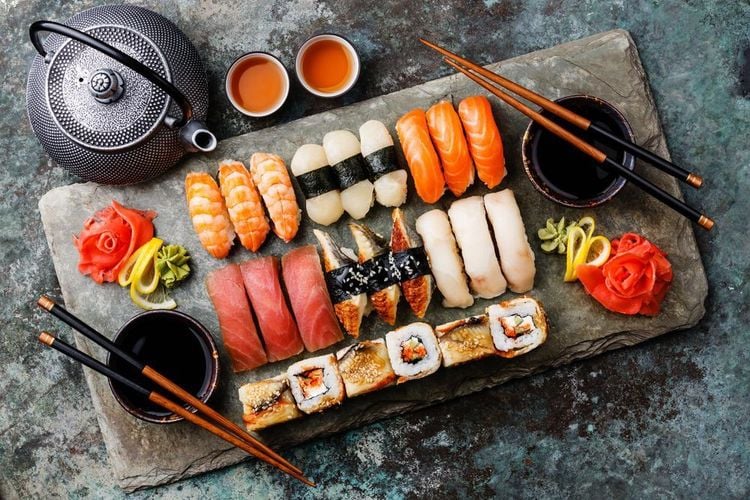
Sushi gồm cá, wasabi, rong biển và gừng ngâm
3. Is eating sushi fat?
To answer the question of whether eating sushi is fat, we need to know information about the content of carbs, fiber, fat and protein.
3.1 Sushi contains refined carbs and is low in fiber
The main ingredient of sushi is white rice that has been refined and removed most of the fiber, vitamins and minerals. High intake of refined carbs has been studied and shown to be associated with spikes in blood sugar, promotes inflammation and increases the risk of diabetes and heart disease.
Furthermore, sushi rice is usually prepared with sugar. The added sugar and low fiber content means that sushi's carbs are broken down quickly in the digestive system. So it's likely that you'll end up eating a lot of sushi and thus be prone to spikes in blood sugar and insulin.
However, other studies show that rice vinegar added to sushi can help lower blood sugar, blood pressure, and fat.
To avoid eating too much sushi that can cause weight gain because sushi contains a large amount of refined carbs, low in fiber and protein, which increases the risk of inflammation, type 2 diabetes and heart disease, you can use brown rice instead. for white rice to make sushi. Besides, to increase the fiber content and nutritional value, it is recommended to roll sushi with less rice and more vegetables.
3.2 Sushi is low in protein and high in fat
Sushi is also considered a weight loss friendly food. However, many types of sushi are prepared with high-fat sauces and breadcrumbs, thus significantly increasing the calorie content.
In addition, a piece of sushi contains only a very small amount of fish or vegetables, so it provides very little protein and fiber, so sushi is not an effective food to reduce hunger and cravings.
Try topping sushi with miso soup, edamame, sashimi or wakame salad to make you feel fuller longer and avoid sushi with fatty sauces as high calories can cause weight gain.
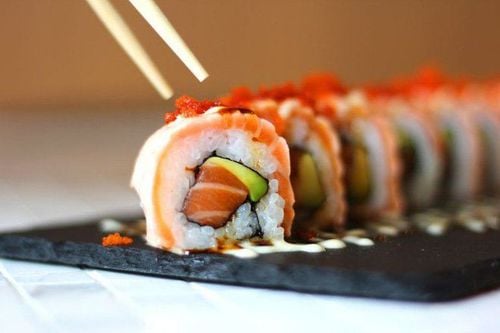
Sushi cung cấp ít protein và chất xơ
4. Is eating sushi good?
Although the ingredients are rich in nutrients, sushi also makes many people afraid to eat because of the following unhealthy properties.
4.1 Sushi with high salt content
Sushi is a dish that contains a large amount of salt, consisting of rice cooked with salt, smoked fish and pickles. Sushi is also served with soy sauce, which has a lot of salt. Eating too much salt can increase the risk of stomach cancer, contributing to the development of high blood pressure in people who are sensitive to salt.
To reduce the amount of salt when eating sushi, should minimize or avoid eating sushi with soy sauce, or avoid eating sushi dishes made with smoked fish, such as mackerel or salmon. In addition, to limit the amount of salt in the body, it is also necessary to avoid using miso soup when eating sushi because miso soup contains a lot of salt.
4.2 Bacterial and parasitic infections when eating sushi
Eating salmon sushi with raw salmon ingredients can be contaminated with various bacteria and parasites such as Salmonella, Vibrio, Anisakis and Diphyllobothrium.
Sushi is not guaranteed to be safe because the US Food and Drug Administration (FDA) does not regulate the use of the label "fish used to prepare sushi". Instead, the FDA only mandates the freezing of certain types of fish to kill parasites in the fish before it is processed and eaten raw.
So whether eating sushi is good or not depends on the proper and appropriate handling and processing of food. To reduce the risk of food poisoning when eating sushi, go to reputable restaurants as these are more likely to be restaurants that have followed food safety procedures.
Or should eat sushi made from cooked fish. Pregnant women, young children, the elderly and people with weakened immune systems should avoid eating raw fish sushi.
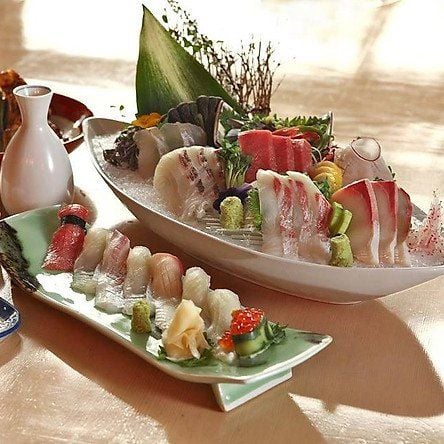
Sushi cá hồi dễ bị nhiễm các vi khuẩn và ký sinh trùng
4.3 Eating sushi can be contaminated with mercury and other toxins
Raw fish not only contain disease-causing parasites, but can also contain heavy metals such as mercury due to polluted oceans. Predatory fish such as tuna, swordfish, and mackerel tend to contain the highest levels of mercury.
So whether it's good to eat sushi also depends on what kind of fish is used. Certain types of seafood contain less mercury, such as salmon, eel, sea urchin, crab, and octopus.
However, other toxins found in fish can lead to ciguatera or scombroid poisoning. In which, ciguatera poisoning is found in sea bass, grouper and snapper, and scombroid poisoning is caused by tuna and mackerel. To reduce the risk of mercury poisoning when eating sushi, avoid eating sushi made from fish that are more likely to live in polluted marine environments.
5. How good is it to eat salmon sushi in particular and sushi in general?
To make sushi a delicious and healthy dish, eat salmon sushi in particular and sushi in general according to these simple guidelines:
Increase the nutrient content of sushi by eating sushi made from brown rice instead of brown rice. for white rice. Roll sushi cones to reduce the amount of rice. Increase the protein and fiber content of sushi by serving with salad, miso soup or sashimi. Avoid serving with cream cheese, fatty sauces or tempura breaded sushi. Instead, add vegetables when eating sushi to create crunch. Reduce the amount of soy sauce when served with sushi. Eat sushi from reputable restaurants, following proper food safety procedures. Sushi is a delicious dish that provides a number of vitamins, minerals, and health-promoting compounds. However, eating sushi is good or not, is it healthy no longer depends on the content of nutrients in sushi, the processing method as well as the food safety process must always be ensured.
Please dial HOTLINE for more information or register for an appointment HERE. Download MyVinmec app to make appointments faster and to manage your bookings easily.
Reference source: healthline.com




